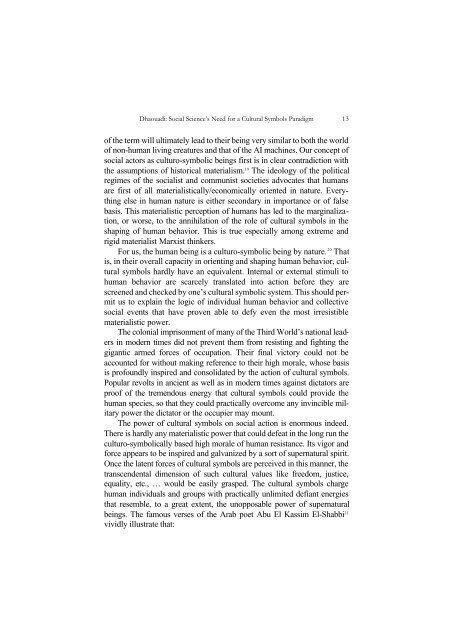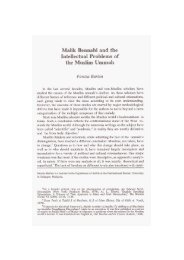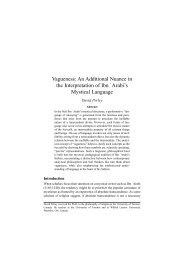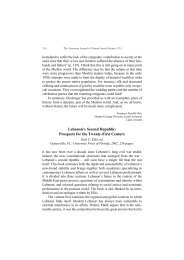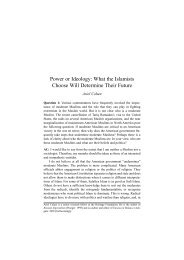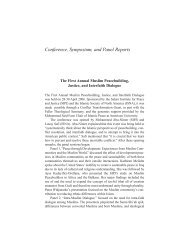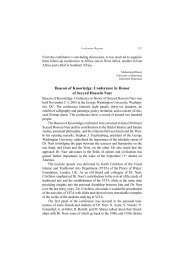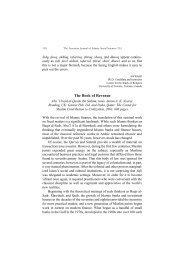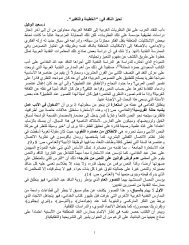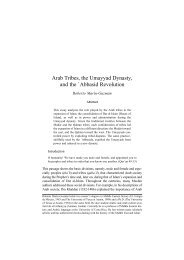Social Science's Need for a Cultural Symbols ... - Epistemology
Social Science's Need for a Cultural Symbols ... - Epistemology
Social Science's Need for a Cultural Symbols ... - Epistemology
Create successful ePaper yourself
Turn your PDF publications into a flip-book with our unique Google optimized e-Paper software.
Dhaouadi: <strong>Social</strong> Science’s <strong>Need</strong> <strong>for</strong> a <strong>Cultural</strong> <strong>Symbols</strong> Paradigm 13<br />
of the term will ultimately lead to their being very similar to both the world<br />
of non-human living creatures and that of the AI machines. Our concept of<br />
social actors as culturo-symbolic beings first is in clear contradiction with<br />
the assumptions of historical materialism. 19 The ideology of the political<br />
regimes of the socialist and communist societies advocates that humans<br />
are first of all materialistically/economically oriented in nature. Everything<br />
else in human nature is either secondary in importance or of false<br />
basis. This materialistic perception of humans has led to the marginalization,<br />
or worse, to the annihilation of the role of cultural symbols in the<br />
shaping of human behavior. This is true especially among extreme and<br />
rigid materialist Marxist thinkers.<br />
For us, the human being is a culturo-symbolic being by nature. 20 That<br />
is, in their overall capacity in orienting and shaping human behavior, cultural<br />
symbols hardly have an equivalent. Internal or external stimuli to<br />
human behavior are scarcely translated into action be<strong>for</strong>e they are<br />
screened and checked by one’s cultural symbolic system. This should permit<br />
us to explain the logic of individual human behavior and collective<br />
social events that have proven able to defy even the most irresistible<br />
materialistic power.<br />
The colonial imprisonment of many of the Third World’s national leaders<br />
in modern times did not prevent them from resisting and fighting the<br />
gigantic armed <strong>for</strong>ces of occupation. Their final victory could not be<br />
accounted <strong>for</strong> without making reference to their high morale, whose basis<br />
is profoundly inspired and consolidated by the action of cultural symbols.<br />
Popular revolts in ancient as well as in modern times against dictators are<br />
proof of the tremendous energy that cultural symbols could provide the<br />
human species, so that they could practically overcome any invincible military<br />
power the dictator or the occupier may mount.<br />
The power of cultural symbols on social action is enormous indeed.<br />
There is hardly any materialistic power that could defeat in the long run the<br />
culturo-symbolically based high morale of human resistance. Its vigor and<br />
<strong>for</strong>ce appears to be inspired and galvanized by a sort of supernatural spirit.<br />
Once the latent <strong>for</strong>ces of cultural symbols are perceived in this manner, the<br />
transcendental dimension of such cultural values like freedom, justice,<br />
equality, etc., … would be easily grasped. The cultural symbols charge<br />
human individuals and groups with practically unlimited defiant energies<br />
that resemble, to a great extent, the unopposable power of supernatural<br />
beings. The famous verses of the Arab poet Abu El Kassim El-Shabbi 21<br />
vividly illustrate that:


